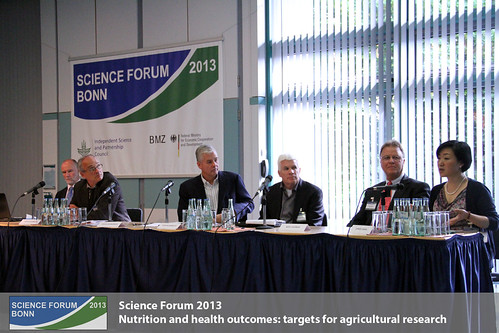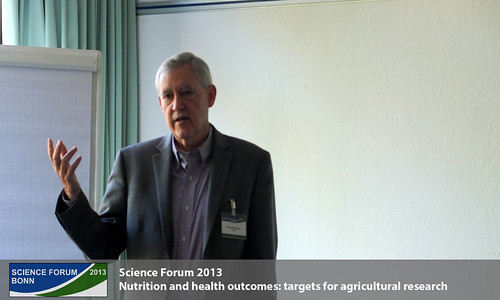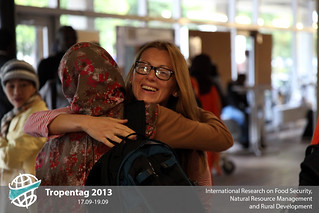Minette Flora Mendoza De Asis's blog
Research agenda should start from the plate
Mon, 09/30/2013 - 16:48 — Minette Flora M...
“Look at what people consume”, dares Frank Rijsberman of the CGIAR Consortium of Board Members. “Research agendas in the past had a strong focus on the supply side, it is high time to re-shift and start with the demand – basically looking at what people want”, he added. Earlier, there was an over-focus on staple based food such as grains. However, there should be an appropriate balance of food into CGIAR programs such as animal sourced food, legumes and lentils
 Plenary: The Way Forward
Toilets in the research agenda
Frank Rijsberman apparently is a water person having worked in IWMI and the Bill & Melinda Gates Foundation’s project on Water, Sanitation & Hygiene. With these backgrounds, he stressed on the importance of water as an input to agriculture and emphasized to bring sanitation and hygiene in the agenda. He gave an example on the impact of treated water (from toilets) in peri-urban agriculture.
Plenary: The Way Forward
Toilets in the research agenda
Frank Rijsberman apparently is a water person having worked in IWMI and the Bill & Melinda Gates Foundation’s project on Water, Sanitation & Hygiene. With these backgrounds, he stressed on the importance of water as an input to agriculture and emphasized to bring sanitation and hygiene in the agenda. He gave an example on the impact of treated water (from toilets) in peri-urban agriculture.
 Plenary: The Way Forward
Toilets in the research agenda
Frank Rijsberman apparently is a water person having worked in IWMI and the Bill & Melinda Gates Foundation’s project on Water, Sanitation & Hygiene. With these backgrounds, he stressed on the importance of water as an input to agriculture and emphasized to bring sanitation and hygiene in the agenda. He gave an example on the impact of treated water (from toilets) in peri-urban agriculture.
Plenary: The Way Forward
Toilets in the research agenda
Frank Rijsberman apparently is a water person having worked in IWMI and the Bill & Melinda Gates Foundation’s project on Water, Sanitation & Hygiene. With these backgrounds, he stressed on the importance of water as an input to agriculture and emphasized to bring sanitation and hygiene in the agenda. He gave an example on the impact of treated water (from toilets) in peri-urban agriculture. If Vitamin A Capsule Supplementation is cheap, then why do we need bio-fortified food?
Mon, 09/30/2013 - 14:50 — Minette Flora M...
“Biofortification is more cost effective because a seed can be passed on to your neighbors”, says Howarth Bouis of Harvest Plus. He tries to compare the cost categories of Vitamin A capsule supplementation program vis a vis breeding crops to increase their nutritional value, also called biofortification. The former which cost about USD0.2–0.3 / per capsule is relatively cheap; however, the intervention has to be implemented each year to Vitamin A deficient target groups. “Whereas the latter is more sustainable, because you pass on to the community the breeding of bio-fortified seeds”. With the power of agricultural research, germ plasms of Vitamin A rich food sources such as cassava, maize and orange sweet potato has been developed and released for adoption.
 Howarth Bouis
Howarth Bouis
 Howarth Bouis
Howarth Bouis
Quality of food over quantity matters, what the German development cooperation has to say
Fri, 09/27/2013 - 16:07 — Minette Flora M...
About 200 million euros until 2020 will be invested by the German development cooperation to interventions in rural development, agriculture and food security, says Stefan Schmitz of the BMZ. There is again a renewed international interest in these sectors, however, the commitments are long overdue. Linking agriculture, health and nutrition is the key development policy as it reduces poverty compared to other investments. “We will have a stronger focus now on healthy and nutritious food that is readily accessible and available”, he added.
 Plenary: The Way Forward
Plenary: The Way Forward
 Plenary: The Way Forward
Plenary: The Way Forward
Facts and Figures: Did you know that cooking loses the beta carotene in food?
Tue, 09/24/2013 - 11:07 — Minette Flora M...
The study conducted by Inge Brouwer of Wageningen University confirms that beta carotene retention in raw food is higher than in cooked food. She took the example of sukuma wiki, a wild plant that is native in Kenya. During 28 hours of storage, the Beta carotene content of cooked sukuma wiki decreases from about 2.8 mg/100g to 1.6, while in raw food it slows down from 3.5 mg/100g to 2.1. One of the knowledge gaps she raised is how food composition tables especially for processed food can be improved.
 Inge Brouwer
This study of sukuma wiki came about with the question of “Can local diets fulfill all nutrient requirements?” This is under the assumption that diet diversity, using locally available, acceptable and affordable food, can fulfill the energy and micro-nutrient needs of people. She concluded that apart from sukuma wiki which is already explored, improvement of diets with locally available food may not fulfill all the nutrient requirements such as iron, calcium and zinc. She cautioned that more information is needed before promoting them.
If you want to learn more about how to identify the nutrients people obtain from their local diets, you can visit this website (http://www.fantaproject.org/tools/optifood).
Inge Brouwer
This study of sukuma wiki came about with the question of “Can local diets fulfill all nutrient requirements?” This is under the assumption that diet diversity, using locally available, acceptable and affordable food, can fulfill the energy and micro-nutrient needs of people. She concluded that apart from sukuma wiki which is already explored, improvement of diets with locally available food may not fulfill all the nutrient requirements such as iron, calcium and zinc. She cautioned that more information is needed before promoting them.
If you want to learn more about how to identify the nutrients people obtain from their local diets, you can visit this website (http://www.fantaproject.org/tools/optifood).
 Inge Brouwer
This study of sukuma wiki came about with the question of “Can local diets fulfill all nutrient requirements?” This is under the assumption that diet diversity, using locally available, acceptable and affordable food, can fulfill the energy and micro-nutrient needs of people. She concluded that apart from sukuma wiki which is already explored, improvement of diets with locally available food may not fulfill all the nutrient requirements such as iron, calcium and zinc. She cautioned that more information is needed before promoting them.
If you want to learn more about how to identify the nutrients people obtain from their local diets, you can visit this website (http://www.fantaproject.org/tools/optifood).
Inge Brouwer
This study of sukuma wiki came about with the question of “Can local diets fulfill all nutrient requirements?” This is under the assumption that diet diversity, using locally available, acceptable and affordable food, can fulfill the energy and micro-nutrient needs of people. She concluded that apart from sukuma wiki which is already explored, improvement of diets with locally available food may not fulfill all the nutrient requirements such as iron, calcium and zinc. She cautioned that more information is needed before promoting them.
If you want to learn more about how to identify the nutrients people obtain from their local diets, you can visit this website (http://www.fantaproject.org/tools/optifood).
Brigitte Maass, forage expert of CIAT encourages young scientist to participate in the Tropentag
Fri, 09/20/2013 - 12:16 — Minette Flora M...
“Trying out for the Tropentag is an excellent opportunity to get an exposure”, says Brigitte Maass who has been mentoring graduate students and early career scientists throughout her 40 years of scientific career. “I like mentoring and I always make sure that my students gets to submit an abstract for oral or poster presentations before they leave to their home countries”, she added. “The Tropentag is a great opportunity to meet people and to see what scientists are doing, young and old alike – nobody works on long term projects – so it is important to keep and maintain relationships and build new once”, she said.
 maintaining relationships
maintaining relationships
 maintaining relationships
maintaining relationships
Money Money Money
Fri, 09/20/2013 - 09:56 — Minette Flora M...
The amount of money earned from cultivating vegetables in Kenya, growing peppers in India, producing timber products and farming Pangasius in Vietnam is the common denominator in the session of value chains. Similarly, wealth in Bangladesh determines a person’s willingness to purchase an insurance.
Can hybrid rice feed the world?
Wed, 09/18/2013 - 13:05 — Minette Flora M...
“The adoption of hybrid rice as an agricultural innovation can have a positive impact on food security”, says Till Ludwig, this year’s awardee of the prestigious Hans Ruthenberg Award for graduates. Although population is projected to increase dramatically in the future years consequently affecting the supply in food insecure areas, he added that its adoption can improve the rice consumption per capita between 0.17% and 7.62% especially in countries that are dependent on rice as a staple food crop.
The research entitled “Impact of Hybrid Rice on Food Security. A Spatial Partial Equilibrium Analysis of Global Adoption and Diffusion of Hybrid Rice Varieties” has been taken seriously by scientists and its substantial impact have made it to be accepted for publication in the International Rice Research Institute. However, Till cautioned that it is a consumer oriented research. Looking at the production system of hybrid rice, the disadvantages still outweighs the benefits, and one should take into account that the bulk of rice consumers are in fact smallholder rice producers.
Welcome On Board, Philipp Gassner
Mon, 09/16/2013 - 11:09 — Minette Flora M...
Philipp, student reporter welcomes you to the Tropentag!
Philipp is an MSc Student in Environmental Governance at the University of Freiburg. Being a hardcore Bavarian, he chooses instead to work in South East Asia as a consultant for science and sustainability communication! You can follow his blog on ‘sustainability science beyond the ivory tower’ on this website




